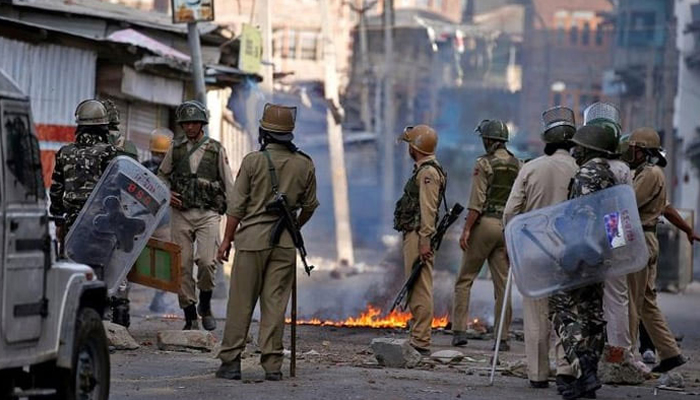The erosion of fundamental freedoms in IIOJ&K
On August 5, 2019, the Indian government abrogated Article 370, stripping Jammu and Kashmir of its special autonomous status. This controversial move, which bifurcated the region into two Union Territories-Jammu & Kashmir and Ladakh-was touted by the Indian government as a step towards ‘greater integration’ and ‘development’. However, five years on, the region continues to grapple with a severe erosion of fundamental freedoms, characterized by arbitrary detentions, extrajudicial killings, and widespread human rights abuses. Despite claims of reduced violence, the repression of basic rights remains a pressing concern. Human Rights Watch and other international observers have raised concerns about the ongoing restrictions that continue to stifle civil liberties in the region.
Since the revocation of Article 370, the Indian authorities have justified their actions by pointing to a decline in political violence. They argue that the region has seen fewer casualties among civilians and Indian forces personnel. Yet, recent developments tell a different story. A recent surge in violence in the Jammu region since June 2024 has resulted in the deaths of 15 Indian forces personnel and 9 civilians, highlighting the ongoing instability despite claims of improved security.
Human Rights Watch and other organisations have criticised the Indian government’s continued assault on fundamental freedoms. Meenakshi Ganguly, Deputy Asia Director at Human Rights Watch in a statement released on July 31, 2024, remarked, “Indian authorities insist that violence has been contained in Jammu and Kashmir, but in five years they have done little to end the government assault on fundamental freedoms. Kashmiris are unable to exercise their right to free expression, association, and peaceful assembly because they fear they will be arrested, thrown in prison without trial for months, even years.”
The past five years have seen a troubling pattern of arbitrary detentions and extrajudicial killings. The Indian forces have been accused of using excessive force and conducting arbitrary arrests under the guise of counterterrorism operations. Prominent civil society activists and political leaders have faced severe repression. For instance, Nazir Ahmad Ronga, chairman of Jammu and Kashmir’s High Court Bar Association, was arrested in July 2024 under the Public Safety Act (PSA), a draconian law that allows for prolonged detention without trial. Similarly, Mian Abdul Qayoom, a former president of the association and vocal critic of government abuses, was detained on charges of murder.
The use of the PSA and other counterterrorism laws, such as the Unlawful Activities (Prevention) Act (UAPA), has been criticized for its arbitrary application and misuse. These laws, originally intended to combat terrorism, have been wielded to silence dissent and target critics. Kashmiri human rights defender Khurram Parvez has been in detention since November 2021 under the UAPA. Despite international calls for his release, including from the UN Special Rapporteur on Human Rights Defenders, Parvez remains imprisoned. In March 2024, UN experts reported on the “harassment and prolonged detention of human rights defenders and journalists” in India, emphasising the broader repression of civil liberties in Jammu and Kashmir.
The media in Jammu and Kashmir has faced unprecedented restrictions. Since August 2019, over 35 journalists have faced various forms of police actions, including interrogations, raids, threats, physical attacks, and limitations on their freedom of movement. The introduction of a new media policy in June 2020 has facilitated government censorship, making it easier to control and suppress news coverage. The policy introduced in June 2024 to protect public officials from alleged false complaints and to punish media publications for spreading news further threatens press freedom.
Civil society organisations and human rights defenders have also faced mounting challenges. In March 2024, demonstrators in Ladakh, called for greater participation in governance, reflecting growing discontent with the Indian government. Concurrently, religious minorities and migrant workers in Jammu and Kashmir have faced targeted attacks, exacerbating the region’s climate of fear and insecurity.
The High Court of Jammu and Kashmir has expressed frustration over the misuse of the PSA and other preventive detention laws. Judges have criticized the authorities for repeatedly filing new allegations to keep individuals in custody, even after courts have ordered their release. In one notable case, a judge of Jammu and Kashmir High Court remarked, “It appears as if the preventive detention jurisdiction is answerable to no one.” This judicial rebuke underscores the ongoing issues of accountability and abuse within the legal system.
The increasing number of UAPA cases in Jammu and Kashmir reflects the broader trend of using counterterrorism laws to suppress dissent. According to data from the National Crime Records Bureau, the region recorded the highest number of UAPA cases in the country in 2022, with 371 out of a total of 1,005 cases. This trend indicates a significant and troubling escalation in the use of repressive measures against critics, journalists, and human rights defenders.
Despite overt signs of normalcy, such as tourism and economic activities, a sense of disillusionment and frustration persists among the people of Jammu and Kashmir. The underlying tension reflects the deep-seated issues facing the region. The lack of genuine political engagement, the continued repression of freedoms, and the arbitrary use of laws have created an atmosphere of fear and resentment. The Indian government’s approach to the occupied territory has failed to address the core grievances of its people and has instead perpetuated a cycle of repression.
The past five years in Indian illegally occupied Jammu and Kashmir (IIOJ&K) have been marked by a troubling erosion of fundamental freedoms. Despite claims of reduced violence, the reality on the ground reveals a persistent and widespread assault on civil liberties. The Indian government’s approach, characterized by arbitrary detentions, extrajudicial killings, and repression of dissent, has failed to address the underlying issues and has instead exacerbated the region’s challenges. Restoring fundamental freedoms in Jammu and Kashmir requires a commitment to human rights, transparency, and genuine political engagement. Until these steps are taken, the people of Jammu and Kashmir will continue
to face a climate of fear and repression, undermining the region’s prospects for peace and stability.
-
 Bruce Springsteen Makes Strong Political Statement
Bruce Springsteen Makes Strong Political Statement -
 Prince Harry Relationship With King Charles 'not Straightforward,' Says Expert
Prince Harry Relationship With King Charles 'not Straightforward,' Says Expert -
 Truth Behind Jennifer Lopez's 'rude' Glambot Moment Laid Bare
Truth Behind Jennifer Lopez's 'rude' Glambot Moment Laid Bare -
 Nicole Richie Still Loves This Makeup Trend From Her Teen Years
Nicole Richie Still Loves This Makeup Trend From Her Teen Years -
 Meghan Markle Plans To Hide Behind Kids Over Return To UK
Meghan Markle Plans To Hide Behind Kids Over Return To UK -
 Dolly Parton Marks Major Milestone As State Governor Honors Her Legacy
Dolly Parton Marks Major Milestone As State Governor Honors Her Legacy -
 Karley Scott Collins Reacts To Rumours Of Her Dating Keith Urban
Karley Scott Collins Reacts To Rumours Of Her Dating Keith Urban -
 Meghan Markle Sends Shockwaves With Promise Of Chaos: ‘Has The Power To Upset The Royals’
Meghan Markle Sends Shockwaves With Promise Of Chaos: ‘Has The Power To Upset The Royals’ -
 Jesy Nelson, Zion Foster Call It Quits Amid Twins' Heartbreaking Diagnosis: Source
Jesy Nelson, Zion Foster Call It Quits Amid Twins' Heartbreaking Diagnosis: Source -
 What King Charles Told Princess Diana In Letter Before Wedding?
What King Charles Told Princess Diana In Letter Before Wedding? -
 David Crosby Said This One Singer Had 'no Talent At All'
David Crosby Said This One Singer Had 'no Talent At All' -
 Meghan Markle’s Return Risks Setting Off Something ‘exhausting’ And William, Kate Are Bracing
Meghan Markle’s Return Risks Setting Off Something ‘exhausting’ And William, Kate Are Bracing -
 Bruce Springsteen Reveals Singer He Finds To Be Greatest Rock And Roll Voice
Bruce Springsteen Reveals Singer He Finds To Be Greatest Rock And Roll Voice -
 Andrew Mountbatten Windsor Ensures Teddy Bear Collection Reaches New Home
Andrew Mountbatten Windsor Ensures Teddy Bear Collection Reaches New Home -
 Ben Affleck Recalls 'throwing Up' During 'Armageddon' Final Scene
Ben Affleck Recalls 'throwing Up' During 'Armageddon' Final Scene -
 Kevin Costner Marks 71st Birthday With Decades-old Throwback Photos
Kevin Costner Marks 71st Birthday With Decades-old Throwback Photos




